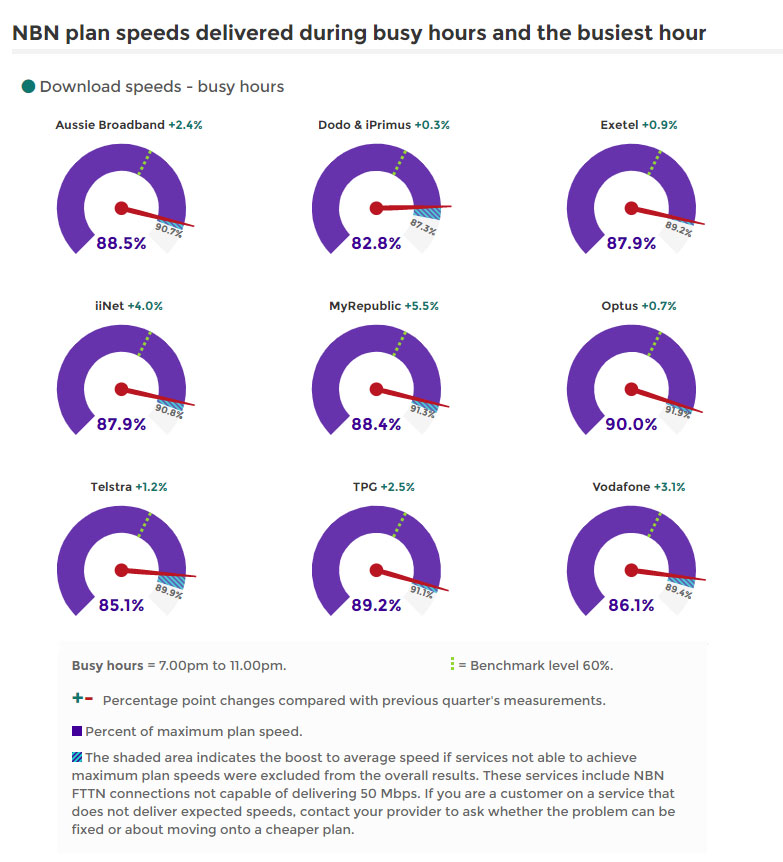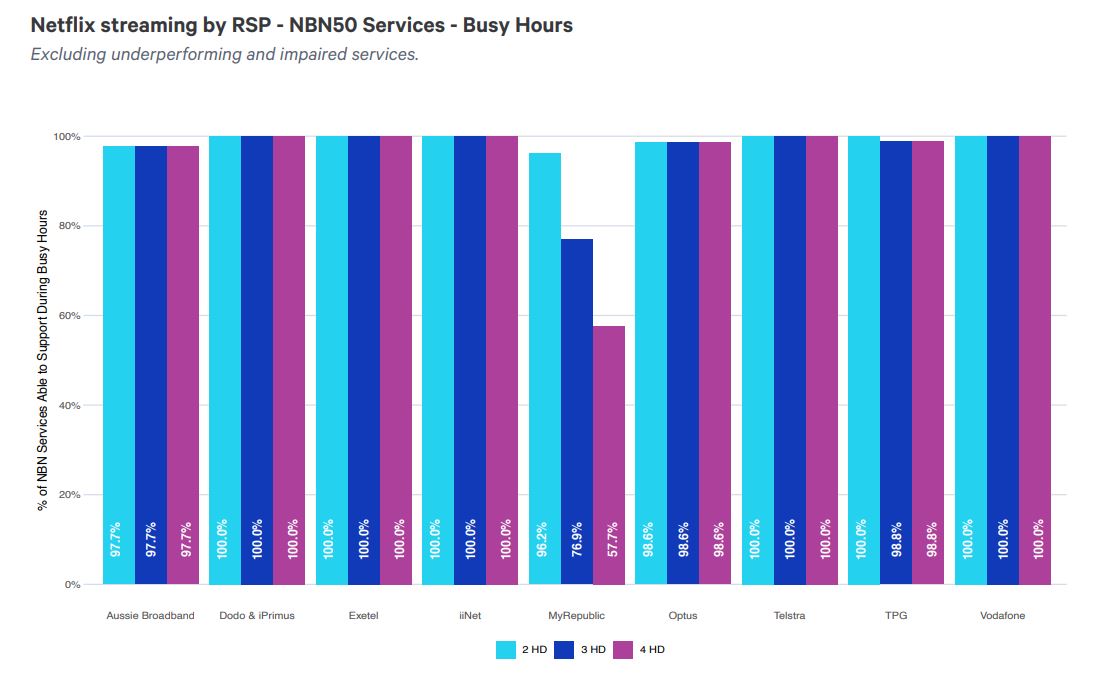The Australian Competition and Consumer Commission has (finally!) dropped its latest report on the state of NBN speeds across Australia, offering a valuable insight into how plans and providers have performed over the last quarter. And although there are no big surprises, the good news is that — in spite of increasing traffic thanks to nationwide and Victorian lockdowns — the network has held it together throughout mid-2020.
The 10th Measuring Broadband Australia Report assesses the average speeds of Australia’s 10 biggest NBN providers, recording data from thousands of tests performed between May 22 and June 20 on fixed-line connections. Once again, Optus has delivered the overall fastest average download speeds in peak hours, taking out the number-one spot for the fourth quarter in a row.
Results are calculated by measuring the average download and upload speeds achieved on participating plans between the peak traffic hours of 7pm and 11pm each day. While speeds are typically measured in megabits per second (Mbps), the ACCC tracks each provider’s results as a percentage of its maximum possible plan speed. This means that the higher a provider’s speed percentage, the more consistently fast its plans were over the 30 days of ACCC testing, delivering a valuable insight into the real-world performance of the most popular plans on the market.
Notably, this is the first quarterly ACCC report to assess the impact of the COVID-19 pandemic on broadband speeds. With millions of Australians bunkering down and working or studying from home during the May to June period, the NBN faced increased demand across the country — but thanks to efforts from both NBN Co and internet service providers, speeds remained impressively consistent.
Fastest download speeds
Optus has once more pipped rival TPG for the first-place position, with an average busy hour download performance of 90.0% of the maximum potential speed of each plan tested. TPG came in second with an average of 89.2%, followed by Aussie Broadband with 88.5%. Telstra, Vodafone, Exetel, iiNet, MyRepublic, Dodo and iPrimus were also included in testing, with results below.
The full download speed results are:
- Optus: 90.0%
- TPG: 89.2%
- Aussie Broadband: 88.5%
- MyRepublic: 88.4%
- Exetel: 87.9%
- iiNet: 87.9%
- Vodafone: 86.1%
- Telstra: 85.1%%
- Dodo & iPrimus: 82.8%
If you’re interested in plans from the above providers, we’ve listed several below. The following table shows a selection of published unlimited Standard Plus Evening Speed (NBN 50) plans on Canstar Blue’s database, listed in order of their cost, from the lowest to highest and then by data allowance, largest to smallest. Use our comparison tool to see plans from a range of other providers. This is a selection of products with links to a referral partner.
All 10 providers tested achieved faster average speeds compared to the ACCC’S May report, with MyRepublic and iiNet showing the most improvement. Each telco scored well over 80% on average, which is great news for customers concerned that a spike in traffic would lead to a drop in performance.
Measuring download speeds by tier and plan type across all providers, NBN 100 plans served up speeds of 88Mbps on average during evening busy hours, with NBN 50 delivering speeds of 43.3Mbps. NBN 25 clocked in at 22.8Mbps, while ADSL plans achieved 9.4Mbps.

Fastest Netflix streaming speeds
This quarter’s report also takes a look at average video streaming performance, measuring the ability of providers to maintain at least one high-definition Netflix stream during busy hours. To test each telco’s streaming speeds, the ACCC recorded the ability of each provider to support up to four high-definition Netflix streams on the NBN 50 speed tier between 7pm and 11pm. Tests were also conducted on NBN 12, NBN 25, and NBN 100 tiers, with the ACCC keen to include new gigabit-speed NBN 1000 in future reports.
While results were similar across most providers — with Exetel, iiNet, Telstra, Dodo, iPrimus and Vodafone all able to support four simultaneous HD streams in 100% of tests — MyRepublic showed considerable lag, only achieving all four HD streams in 57.7% of services. However, the ACCC does note only 27 whiteboxes (home connections) offered data on MyRepublic’s Netflix performance, so advises customers that these results are ‘indicative only’.

Fastest upload speeds
Exetel has smashed out the best result for upload speeds for the second consecutive quarter, achieving 90.1% of the maximum plan speed on average. In second place again is TPG (86.8%), followed by Aussie Broadband, Optus and MyRepublic, all with 86.2%.
The full upload speed results are:
- Exetel: 90.1%
- TPG: 86.8%
- Aussie Broadband: 86.2%
- MyRepublic: 86.2%
- Optus: 86.2%
- iiNet: 85.5%
- Telstra: 84.7%
- Vodafone: 81.4%
- Dodo & iPrimus: 82.2%
ACCC: NBN speeds improving, despite COVID-19
As a whole, it’s an encouraging result for the NBN, but performance was undoubtedly bolstered by the decision to increase capacity by up to 40% to help offset the strain caused by the COVID-19 pandemic. Increased capacity at no extra cost is currently available to NBN providers until 30 November 2020, after which NBN Co may choose to again extend the offer.
“We have seen an improvement in download speeds for all speed tier plans and across all retail service providers (RSPs) during the period from May to June,” said ACCC Chair Rod Sims.
“NBN Co’s decision to offer RSPs 40% extra network capacity for free has been vital to the network’s sustained performance, and we welcome their decision to extend this offer until 30 November.”
While the ACCC is happy with NBN Co’s anti-congestion tactics, Aussie Broadband Managing Director Phillip Britt has previously warned consumers to expect a price hike or a speed drop when network capacity returns to normal. How the pandemic will affect NBN prices long-term isn’t set in stone, but if you’re worried about changing costs or underperforming speeds, it’s never a bad time to compare NBN plans.


Share this article